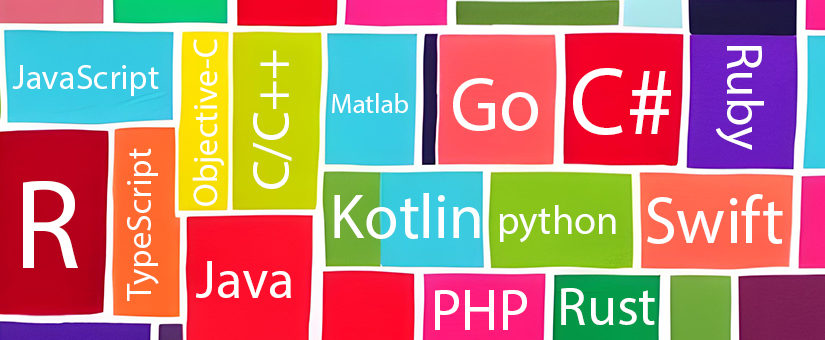
What are the most popular programming languages in 2023?
Programming languages play a crucial role in developing software and applications, and the landscape of popular languages is constantly evolving. In recent years, there has been a trend toward higher-level languages that are easier to learn and use and towards languages that support modern paradigms such as object-oriented, functional, or reactive programming.
One of the most popular programming languages in recent years is Python, which has a wide range of applications, including web development, data science, and machine learning. Python’s popularity is driven by its simplicity, readability, and large libraries and frameworks available for various tasks.
Another popular language is Java, widely used for building enterprise applications and Android apps. Java is known for its portability, scalability, and security and has a large developer community and ecosystem.
JavaScript is a popular language, particularly for web development, and is supported by all modern web browsers. Recently, there has been a trend towards using JavaScript for server-side development, using platforms such as Node.js.
C# is a popular language for developing Windows applications and games and is often used with the .NET framework. C/C++ is a lower-level language commonly used for systems programming and performance-critical applications.
In addition to these established languages, there has also been a rise in the popularity of newer languages such as TypeScript, Swift, and Kotlin. These languages offer improved features and capabilities over their predecessors and are being adopted by developers for various tasks.
Overall, the popularity of programming languages is constantly changing, driven by the needs and trends of the software industry. It is essential for developers to stay up to date with the latest languages and technologies to stay competitive and deliver the best solutions for their clients or users.
These are the most popular programming languages as of the beginning of 2023.

Python (27.93% share): Python is the most popular programming language, with a wide range of applications, including web development, data science, machine learning, and scientific computing. It is known for its simplicity, readability, and flexibility. Python’s popularity has decreased slightly (-0.9%) in this ranking.
Java (16.78% share): Java is a popular language for building enterprise applications and is widely used in Android app development. It is known for its portability, scalability, and security. Java’s popularity has decreased (-1.3%) in this ranking.
JavaScript (9.63% share): JavaScript is a programming language commonly used in web development to add interactivity to websites. It is supported by all modern web browsers and is essential to the web development ecosystem. JavaScript’s popularity has increased (+0.5%) in this ranking.
C# (6.99% share): C# is a general-purpose programming language widely used in developing Windows applications and games. It is known for its simplicity, power, and flexibility and is often used with the .NET framework. C#’s popularity has decreased (-0.3%) in this ranking.
C/C++ (6.9% share): C/C++ is a low-level programming language used to develop operating systems, compilers, and other system-level software. It is known for its efficiency and performance and is often used in applications where performance is critical. C/C++’s popularity has decreased (-0.5%) in this ranking.
PHP (5.29% share): PHP is a server-side programming language commonly used for web development. It is known for its simplicity and flexibility and is often used with databases and server-side frameworks. PHP’s popularity has decreased (-0.8%) in this ranking.
R (4.03% share): R is a programming language and software environment for statistical computing and graphics. It is widely used in data analysis and statistical modeling and is popular in academia and industry. R’s popularity has decreased slightly (-0.2%) in this ranking.
TypeScript (2.79% share): TypeScript is a programming language that is a strict syntactical superset of JavaScript and adds optional static typing to the language. It is often used in large-scale JavaScript applications to improve code quality and maintainability. TypeScript’s popularity has increased (+1.0%) in this ranking.
Swift (2.23% share): Swift is a programming language developed by Apple for building iOS, Mac, watchOS, and tvOS applications. It is known for its simplicity and performance and is designed to be safer than Objective-C. Swift’s popularity has increased (+0.3%) in this ranking.
Objective-C (2.2% share): Objective-C is an object-oriented programming language commonly used to develop applications for Apple’s Mac OS X and iOS operating systems. It is known for its dynamic binding and reflection capabilities. Objective-C’s popularity in this ranking has remained relatively stable (-0.1%).
Go (1.94% share): Go is a programming language developed by Google that is designed for simplicity, concurrency, and performance. It is commonly used for building network servers and other distributed systems. Go’s popularity has increased (+0.7%) in this ranking.
Rust (1.9% share): Rust is a programming language designed for safety, concurrency, and performance. It is commonly used for systems programming and is known for its static type system and memory safety guarantees. Rust’s popularity has increased (+0.9%) in this ranking.
Kotlin (1.81% share): Kotlin is a programming language designed to be more concise and expressive than Java. It is widely used for Android app development and is fully interoperable with Java. Kotlin’s popularity has increased slightly (+0.1%) in this ranking.
Matlab (1.63% share): Matlab is a numerical computing environment and programming language commonly used in scientific and engineering fields. It is known for its powerful matrix manipulation and visualization capabilities. Matlab’s popularity in this ranking has remained relatively stable (-0.1%).
Ruby (1.13% share): Ruby is an object-oriented programming language known for its simplicity and flexibility. It is commonly used for web development and is often used with the Ruby on Rails framework. Ruby’s popularity has increased (+0.3%) in this ranking.
Python is the most popular programming language, with a 27.93% share of developers. It is followed by Java (16.78% share), JavaScript (9.63% share), C# (6.99% share), and C/C++ (6.9% share). These five languages make up a large majority (62.23%) of the developer community.
Overall, the popularity of Python, Java, JavaScript, and C# has remained relatively stable in this ranking, while the popularity of C/C++ has decreased slightly. On the other hand, the popularity of newer languages such as TypeScript, Swift, and Rust has increased.
It is worth noting that these rankings are based on the popularity of languages among developers and do not necessarily reflect their overall usage or relevance in the industry. For example, a language popular among developers may not necessarily be widely used in production, or a language not as famous may still be critical to specific domains. When selecting a programming language, it is always essential to consider a project’s specific needs and requirements.
HiTech Service may be an excellent option to consider if you are looking to outsource software development. The company has a team of experienced professionals with a track record of delivering high-quality services to clients in various industries. HiTech Service offers multiple services, including software development, quality assurance, technical support, and IT consulting. It has expertise in multiple technologies, including desktop, web, mobile, and database technologies. Additionally, the company has implemented processes to ensure the quality of its services, as demonstrated by its ISO 9001:2015 certification. HiTech Service also offers three business models to accommodate the needs of different clients and projects: a dedicated team model, a project-based model, and a spill-over model.
Credits: created with the help of https://chat.openai.com/
- On January 6, 2023
- 0 Comment


